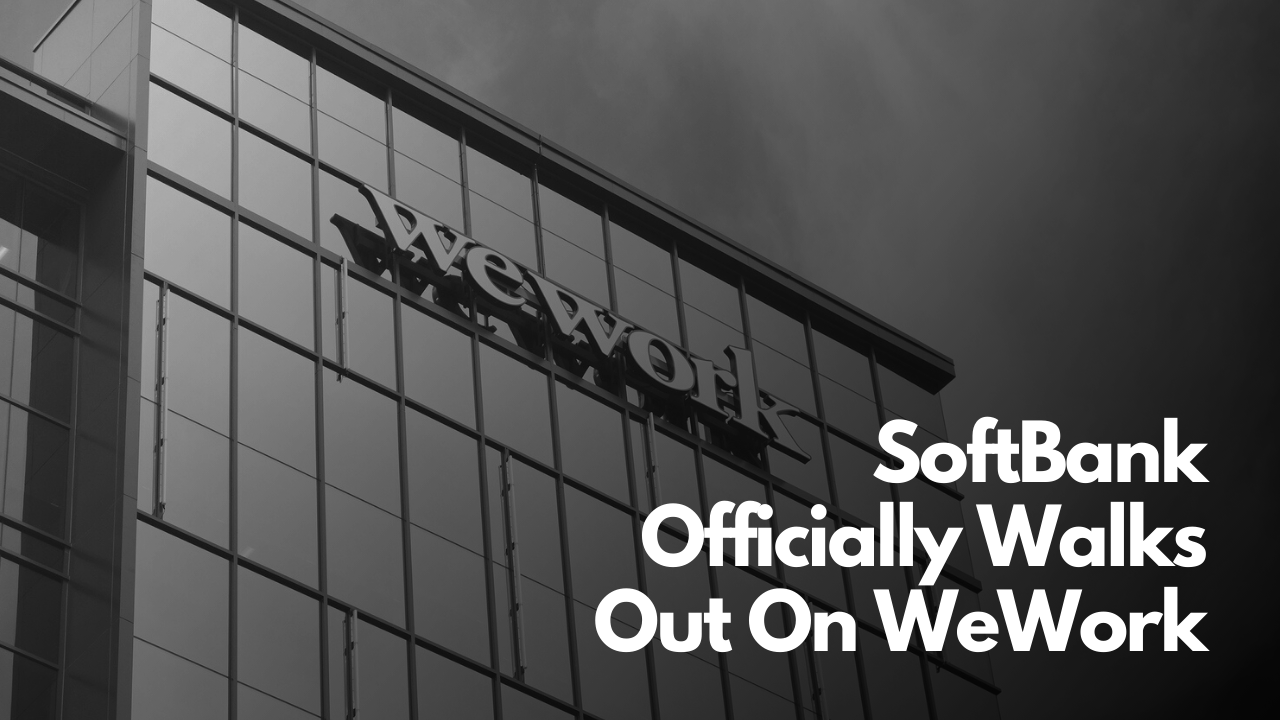- SoftBank has officially retracted its offer to buy $3 billion of WeWork’s shares from existing investors.
- This was part of SoftBank’s financial rescue of the company, and comes as a massive blow for WeWork as it struggles during the global health crisis.
- The legal inquiries into Adam Neumann and WeWork reportedly played a key role in SoftBank’s decision to walk away from the deal.
A couple of weeks ago, news broke that SoftBank was considering backing out of its plan to buy $3 billion of WeWork’s shares from existing investors as part of its financial rescue of the coworking company.
The payment for the shares had April 1st listed as the closing date.
Unfortunately for WeWork, SoftBank has officially retracted its offer.
According to reports, in a statement sent out this morning (April 2nd), SoftBank’s senior VP and Chief Legal Officer, Rob Townsend, said that several of the conditions outlined in the October offer were not met, which left SoftBank with “no choice but to terminate the tender offer”.
The legal inquiries into Adam Neumann and WeWork reportedly played a key role in SoftBank’s decision to walk away from rescuing the coworking company.
For its part, WeWork has said that it would evaluate all of its legal options, including litigation.
Is the End Nigh for WeWork?
Since its failed IPO attempt last year (2019), WeWork has struggled to sustain its valuation and remain afloat. In fact, were it not for SoftBank’s rescue in October last year, the company would have run out of cash by November according to reports.
Still, even with the $1.5 billion that WeWork received in October of last year, the company is far from profitable.
Since the failed IPO attempt, WeWork has laid off thousands of employees and has sold several of its side businesses.
With the COVID-19 pandemic, the business is likely to suffer even more as people stay at home and avoid public places. The company has already stated that it no longer expects to hit its 2020 financial targets and according to Bloomberg, it cut 250 jobs last week.
Though WeWork has kept its locations open during the coronavirus outbreak, it is highly likely that some of its existing members have cancelled their memberships with many others unable to pay them at the moment.
The coworking company is desperately trying to keep members and, more importantly, keep some cash coming in. According to several news reports, this has prompted WeWork to offer some of its tenants 50% off their rent if they sign longer-term agreements.
Cutting longer rent commitments by half has been WeWork’s MO for some time now. It is, in fact, how it poached clients from competitors as early as 2017, and how it filled up new locations. The only difference is that back then, it had plenty of capital and support from investors.
Suggested Reading:
- Desperate Times Call for Desperate Measures: How Low Will WeWork Go?
- Is WeWork Cannibalizing the Industry with the Classic Bait-and-Switch Tactic?
- WeWork Doubles Down on Its Poaching Strategy
- WeWork Poaching Episode 3: the One Where They Go after a Coworking Space Owner
That has changed dramatically since September of last year and it has just taken a turn for the worse with SoftBank’s decision.
The company has been struggling with cash flow for some time now. The news of SoftBank retracting $3 billion that WeWork thought it would have access to spells trouble from all fronts.
The former unicorn company could potentially run out of cash much sooner than anyone had anticipated.
Possible Implications for the Flexible Workspace Industry
The good news is that the industry will survive, despite both the COVID-19 pandemic and the fall of WeWork.
But it is likely that many WeWork locations will close.
Some of these locations could be taken over by property companies or landlords, and others could be taken over by other flexible workspace operators.
The bad news is that the fall of WeWork could lead to a short term loss of confidence in the coworking business model. What this could mean is that property companies and landlords will want more guarantees from operators. This could be particularly relevant now as many operators will want to renegotiate leases with landlords due to the pandemic.
Alternatively and in the long-run, it could also lead to an increase in management agreements between landlords and operators, which would be good news for the industry as this model reduces the risk for operators, and is less capital intensive.

 Dr. Gleb Tsipursky – The Office Whisperer
Dr. Gleb Tsipursky – The Office Whisperer Cat Johnson – Coworking Marketing Maven
Cat Johnson – Coworking Marketing Maven Angela Howard – Culture Expert
Angela Howard – Culture Expert Drew Jones – Design & Innovation
Drew Jones – Design & Innovation Andrea Pirrotti-Dranchak – Competitive Advantage
Andrea Pirrotti-Dranchak – Competitive Advantage Jonathan Price – CRE & Flex Expert
Jonathan Price – CRE & Flex Expert Jeremy Fennema – Tech Innovation Alchemist
Jeremy Fennema – Tech Innovation Alchemist







